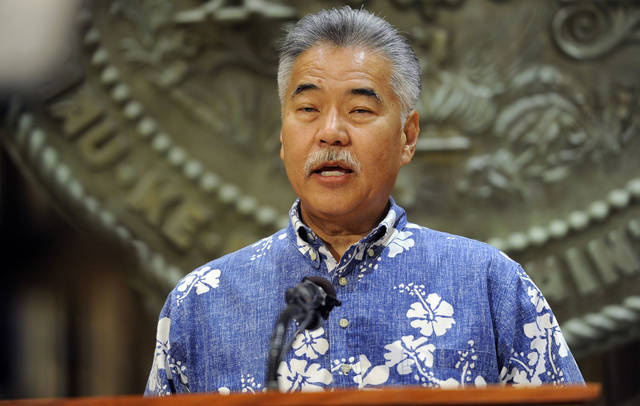Ige vetoes asset forfeiture reform



State Rep. Joy San Buenaventura said Tuesday she’s “very disappointed” that Gov. David Ige vetoed a bill aimed at reforming the statute governing the seizure of an individual’s property by civil asset forfeiture.
House Bill 748, which was introduced by San Buenaventura, who represents Puna, passed both houses of the Legislature unanimously.
ADVERTISING
The measure, which was opposed by law enforcement agencies statewide, received support from the American Civil Liberties Union of Hawaii, the Grassroot Institute of Hawaii, the LGBT Caucus of the Democratic Party of Hawaii, the Drug Policy Alliance and the Drug Policy Forum of Hawaii.
“I introduced this bill to prevent the ongoing seizing and selling of assets from people that have been arrested but not convicted of a crime,” San Buenaventura said in a statement. “… This bill would have required a criminal conviction before law enforcement could forfeit property, and any forfeiture revenue would be directed into the state’s general fund, not into police and prosecutor’s office budgets which is a clear conflict of interest.”
San Buenaventura cited the recent federal convictions of former Honolulu Police Chief Louis Kealoha and his wife, former Honolulu Deputy Prosecutor Katherine Kealoha — without naming them, specifically — to support her assertion additional checks need to be placed on law enforcement.
“With the recent corruption convictions we have seen in Hawaii, lawmakers must work hard to ensure residents that their public officials follow clear ethical guidelines when doing their jobs,” she said. “If signed, this bill would have helped to show that people really are treated equally and fairly in Hawaii.”
A 2018 Hawaii legislative auditor’s report found that in fiscal year 2015, 26% of property seized was done so without a corresponding criminal charge being filed, and 4% of the seizures took place although criminal charges were dismissed.
Ige had announced his intention to veto the measure, which would require a felony conviction before law enforcement can seize an individual’s property in a criminal case and funnel proceeds from the sale of seized property to the state’s general fund.
Currently, a quarter of seizure proceeds goes to the law enforcement unit or units that conducted the investigation that led to the seizure. Another quarter goes to the office of the prosecutor who instituted the forfeiture action. Half is deposited into a criminal forfeiture fund administered by the state attorney general’s office.
Ige, who fielded questions from the media Tuesday, said he thought the measure, if passed into law as written, “would be too restrictive.” He also added there are safeguards to curb abuses of asset forfeiture by law enforcement.
“Certainly, anyone pursuing a forfeiture would have to submit it to the attorney general’s office for review, and they make determinations about whether they believe asset forfeiture would be appropriate,” Ige said. “They do reject a number of requests, because they believe that it wouldn’t be appropriate.”
County Prosecutor Mitch Roth called the governor’s veto “great news.” He said some “half-truths” had been perpetuated by proponents of asset forfeiture reform and added he “doesn’t know of a single case” where civil asset forfeiture has been abused by Hawaii law enforcers.
“With everything that’s happening, especially with drugs, we do believe that asset forfeiture is a deterrent, one of our more effective deterrents against the drug dealers,” Roth said. “Oftentimes, when we’re forfeiting property, the drug dealers are more worried about losing their property than about going to prison. And with the opioid epidemic — last year, over 70,000 people in the United States dying — we want to keep our abilities to deter unlawful activity as strong as possible.”
Email John Burnett at jburnett@hawaiitribune-herald.com.







